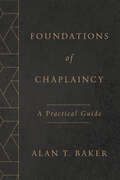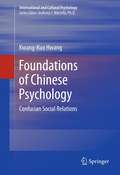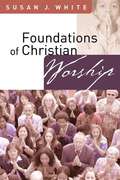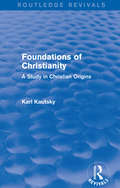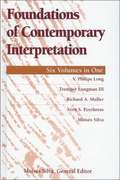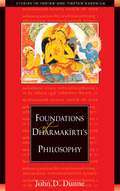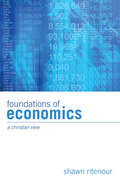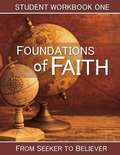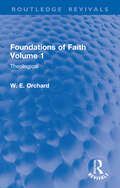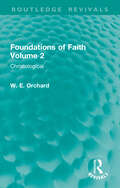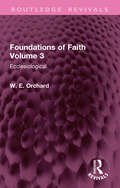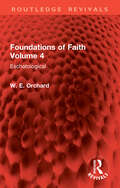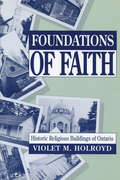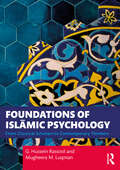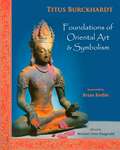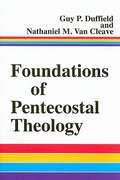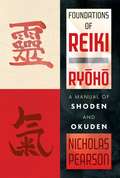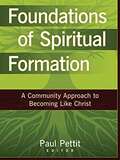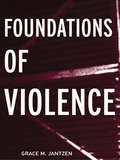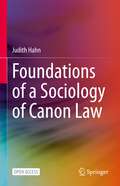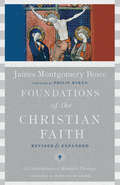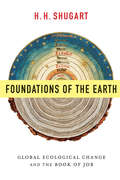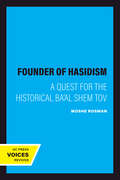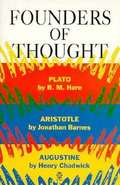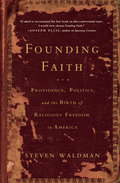- Table View
- List View
Foundations of Chaplaincy: A Practical Guide
by Alan T. BakerAn approachable overview of the nature, purpose, and functional roles of chaplaincy Chaplaincy is unlike any other kind of ministry. It involves working outside a church, without a congregation, usually in a secular organization. It requires ministering to those with starkly different religious convictions, many of whom may never enter a house of worship. It is, as Alan Baker writes, &“ministry in motion.&” Those who are embarking upon this unique and specialized call deserve equally unique and specialized guidance, and Foundations of Chaplaincy offers exactly that. Baker surveys the biblical and theological foundations of chaplaincy before enumerating four specific responsibilities and skills that define chaplaincy&’s &“ministry of presence&”: providing, facilitating, caring, and advising. Baker&’s thorough guidance on these matters is supplemented in sidebars with practical advice and anecdotes from over thirty chaplains currently serving in a variety of settings and organizations. Chaplains who serve in healthcare, the military, correctional institutions, police and fire departments, sports teams, college campuses, and corporations have essential roles to play in their respective organizations, but theirs is rarely an easy calling. With Foundations of Chaplaincy as an introduction and an ongoing reference, those called to this important vocation may be assured of having the tools they need to cultivate a strong, mission-driven pastoral identity rooted in their own theological tradition while simultaneously participating in a multi-faith team.
Foundations of Chinese Psychology
by Kwang-Kuo HwangMainstream psychology emanated from European-American and Judeo-Christian philosophical and scientific traditions. The application of this viewpoint, which embeds colonial and imperialist concepts is less relevant to Asian and other indigenous cultures. Although it has been accepted by non-Western scholars in an attempt to emulate Western scientific practice, the mainstream viewpoint is in a process of transformation to accommodate geographically relevant perspectives. In this light, Foundations of Chinese Psychology, bridges the gap between western and eastern traditions and elaborates on theories based on local phenomena, findings, and experiences by research methods that are contextually appropriate. Using a guiding principle of cultural psychology - 'one mind, many mentalities', this book advocates the balancing of a global psychology concept without sacrificing that of a specific locality and people. It analyzes the basics of Confucionism and compares them to Western ethical thinking, arriving at a series of theories concerning social exchange, face, achievement motivation, organizational behaviors, and conflict resolution. Beyond the specifics of a particular culture, this book exemplifies the act of constructing autonomous social science that may be emulated in other non-Western settings. It also serves as an excellent guide for cross-cultural research as well as a caveat on the limitations of presumptive individualism and exclusionary perspectives.
Foundations of Christian Worship
by Susan J. WhiteProviding structure for thinking seriously about worship as a part of Christian faith and experience, Foundations of Christian Worship addresses the question, what is Christian worship and why do Christians worship as they do? Beginning with an overview of the theological, biblical, historical, and anthropological foundations of Christian worship, Susan J. White then turns to discussing its components--prayer, creeds, music, time, ritual, and art. Later, she delves into the nourishment of the Christian life and the major worship events throughout the human life cycle. Finally, she discusses contemporary challenges to Christian worship and concludes with case studies for further exploration. With helpful appendixes and a glossary of liturgical terms, Susan White's Foundations of Christian Worship is an excellent primer for seminary students and ministers early in their careers.
Foundations of Christianity: A Study in Christian Origins (Routledge Revivals)
by Karl KautskyFirst published in 1925, Karl Kautsky presents a Marxist history of Christianity and Christian society. Divided into four key sections, the book begins by considering the personality of Jesus as portrayed within Pagan and Christian sources and highlighting the Church’s difficulty in presenting a unified and concurrent image of Jesus and interpretation of His words. Next, Kautsky analyses the structure of Roman society, with particular emphasis on the slave-holding system, the Roman State and the historiography of the period. In the third section, an early history of the Jewish people is presented, whilst the final section discusses the beginnings of Christianity and the social struggles present within early Christian society. This is a fascinating reissue, which will be of particular interest to students of Church History, Christian theology and the various interpretations of Jesus.
Foundations of Contemporary Interpretation: Six Volumes In One
by Richard A. Muller Tremper Longman III Moises Silva Vern S. Poythress V. Philips LongFoundations of Contemporary Interpretation seeks to identify and clarify the basic problems of interpretation that affect our reading of the Bible today. This unique volume provides a comprehensive and systematic coverage of the field of general hermeneutics. Foundations of Contemporary Interpretation examines the impact of specific academic disciplines on the interpretation of the Bible. Previously published as separate volumes, its various sections explore the interface between hermeneutics and literary criticism, linguistics, history, science, and theology. Contents include: (i) Has the church misread the Bible? / Moises Silva (ii) Literary approaches to biblical interpretation / Tremper Longman III (iii) God, language and Scripture / Moises Silva (iv)The art of biblical history / V. Philips Long (v) Science and hermeneutics / Vern S. Poythress (vi) The study of theology / Richard A. Muller.
Foundations of Dharmakirti's Philosophy
by John D. DunneThroughout the history of Buddhism, few philosophers have attained the stature of Dharmakirti, the "Lord of Reason" who has influenced virtually every systematic Buddhist thinker since his time. Dharmakirti's renowned works, written in India during the philosophically rich seventh century, argue that the true test of knowledge is its efficacy, and likewise that only the efficacious is knowable and real. Around this central theme is woven an intricate web of interrelated theories concerning perception, reason, language, and the justification of knowledge. Masterfully unpacking these foundations of Dharmakirti's system, John Dunne presents the first major study of the most vexing issues in Dharmakirti's thought within its Indian philosophical context. Lucid and carefully argued, Dunne's work serves both as an introduction to Dharmakirti for students of Buddhism and a groundbreaking resource for scholars of Buddhist thought.
Foundations of Economics: A Christian View
by Shawn RitenourFoundations of Economics: A Christian View is an introduction to economics from an explicitly Christian perspective. It maintains that there is no conflict between Christian doctrine and economic science, properly understood. Therefore, Foundations of Economics has three goals: to demonstrate that the foundations of economic laws are derived from a Christian understanding of nature and humanity; to explain basic economic principles of the market economy and apply them to various economic problems, such as poverty and economic development; and to show the relationship between Christian ethics and economic policy. Foundations of Economics: A Christian View accomplishes these goals by rooting the fundamental principles of human action in the Christian doctrines of creation and humanity, and integrating them with the Christian ethic of private property. This volume explains the relevance of economics for fulfilling the cultural mandate set forth in the first two chapters of Genesis, by demonstrating how economics can help us in our task to be fruitful and multiply and have dominion over the earth, without spoiling creation, starving to death, or descending into a barbaric struggle for survival.
Foundations of Faith Student Workbook 1: From Seeker to Believer
by Wheaton PressPlease note: For multiple copies and curriculum orders for schools please purchase this resource directly from the publisher to receive discounted pricing, free teacher resources, support and coaching. Wheaton Press cannot support bulk orders made by schools through Amazon. com. Please use this link for school orders. http://www. wheatonpress. com/contact. htmlThis student workbook corresponds with the Foundations of Faith 100 level class: From seeker to believer. The focus of the class is to invite students to build a solid foundation of belief in the person of Christ. Students will examine the foundational elements of faith systems and understand the foundational distinctions of a Christ-centered worldview. Students will be challenged to apply the definitions of faith and truth in their examination of the Bible as God's inerrant revelation.
Foundations of Faith Volume 1: Theological (Routledge Revivals)
by W. E. OrchardOriginally published in 1924, this is the first of four volumes to discuss Christian Theology, under the guidance of the historic decisions of the Christian Church and the prevailing tendencies of Catholic thought in the early 20th Century. This volume deals with the fundamental groundwork of Thesim.
Foundations of Faith Volume 2: Christological (Routledge Revivals)
by W. E. OrchardOriginally published in 1925, this is the second of four volumes to discuss Christian Theology, under the guidance of the historic decisions of the Christian Church and the prevailing tendencies of Catholic thought in the early 20th Century. This volume deals with the specific beliefs connected with the person of Christ.
Foundations of Faith Volume 3: Ecclesiological (Routledge Revivals)
by W. E. OrchardOriginally published in 1926, this is the third of four volumes to discuss Christian Theology, under the guidance of the historic decisions of the Christian Church and the prevailing tendencies of Catholic thought in the early 20th Century. This volume is concerned with the Church, considering questions of authority and what is meant by ‘Catholic’.
Foundations of Faith Volume 4: Eschatological (Routledge Revivals)
by W. E. OrchardOriginally published in 1927, this is the final of four volumes to discuss Christian Theology, under the guidance of the historic decisions of the Christian Church and the prevailing tendencies of Catholic thought in the early 20th Century. This volume is concerned with subjects that can generally be summed up under the title Eschatology: that part of theology concerned with death, judgements and the final destiny of the soul.
Foundations of Faith: Historic Religious Buildings of Ontario
by Violet M. HolroydThe Ontario landscape is dotted with places of worship, from the simple log cabin to lofty cathedrals. Behind each lie personal stories of exceptional individuals and historical events, all of which have helped shape our lives.The lovers of Anne of Green Gables may be pleasantly surprised by Lucy Maud Montgomery’s long association with the Leaksdale Manse just north of Toronto. From the James Bay lowlands comes an unusual example of ingenuity involving a historic Moose Factory landmark, while the poignant love story involving Florence Nightingale and a local minister is depicted in the attractive stained glass window of a church in Elora. A more recent page of history is captured through the side-by-side relationship of a synagogue and mosque. Throughout, Foundations of Faith will delight the armchair traveller and invite the mobile history buff to explore Ontario.
Foundations of Islāmic Psychology: From Classical Scholars to Contemporary Thinkers
by G. Hussein Rassool Mugheera M. LuqmanFoundations of Islāmic Psychology: From Classical Scholars to Contemporary Thinkers examines the history of Islāmic psychology from the Islāmic Golden age through the early 21st century, giving a thorough look into Islāmic psychology’s origins, Islāmic philosophy and theology, and key developments in Islāmic psychology. In tracing psychology from its origins in early civilisations, ancient philosophy, and religions to the modern discipline of psychology, this book integrates overarching psychological principles and ideas that have shaped the global history of Islāmic psychology. It examines the legacy of psychology from an Islāmic perspective, looking at the contributions of early Islāmic classical scholars and contemporary psychologists, and to introduce how the history of Islāmic philosophy and sciences has contributed to the development of classical and modern Islāmic psychology from its founding to the present. With each chapter covering a key thinker or moment, and also covering the globalisation of psychology, the Islāmisation of knowledge, and the decolonisation of psychology, the work critically evaluates the effects of the globalisation of psychology and its lasting impact on indigenous culture. This book aims to engage and inspire students taking undergraduate and graduate courses on Islāmic psychology, to recognise the power of history in the academic studies of Islāmic psychology, to connect history to the present and the future, and to think critically. It is also ideal reading for researchers and those undertaking continuing professional development in Islāmic psychology, psychotherapy, and counselling.
Foundations of Oriental Art & Symbolism
by Titus BurckhardtThis fascinating edited collection of art historian Titus Burckhardt''s most important writings on Hindu, Buddhist, and Taoist art is lavishly illustrated with 140 superb examples of Oriental art, architecture, statuary, and painting.
Foundations of Pentecostal Theology
by Nathaniel M. Van Cleave Guy P. DuffieldIn this volume, you will find thorough explanations of the fundamental doctrines of the Christian church, presented not as a theory, but as teaching to be believed and practiced. Those doctrines that are considered to be "distinctives" of the Pentecostal movement (Divine healing, the Baptism with the Holy Spirit, and spiritual gifts) are given more extensive treatment. Co-authored by seasoned and trustworthy men who devoted their lives to scholarly study of the Word, systematic teaching, and expository preaching, this book provides an unmatched resource for all who seek to know sound doctrine that can be incorporated into life and ministry.
Foundations of Reiki Ryoho: A Manual of Shoden and Okuden
by Nicholas PearsonA comprehensive guide to the first and second degrees of Usui Reiki Ryoho as well as Reiki’s history and Western evolution • Details hand positions, self-healing exercises, spiritual development meditations, and the Japanese Reiki techniques introduced in the first degree, shoden, and the second degree, okuden • Provides a thorough introduction to the five levels of byosen, the energetic mechanism used to scan an individual’s energy field and locate areas of disharmony • Examines the core teachings of Reiki founder Usui Mikao and offers a new comprehensive exploration of Reiki’s history and evolution • Explores tools and techniques adapted by Western lineages, such as working with crystals and the chakras Bridging Eastern and Western lineages to reclaim Reiki’s roots as both a healing art and a spiritual practice, Nicholas Pearson offers a new comprehensive exploration of Reiki’s history and evolution, the foundations of Usui Reiki Ryoho theory and practice, and the original techniques and modern tools of both the first degree, shoden, and second degree, okuden. He explores the etymology of key Reiki terminology and presents a complete discussion of the origins of the symbols used in the second degree, providing new historical, cultural, and spiritual context. He examines the core teachings of Reiki founder Usui Mikao, who taught that Reiki Ryoho enacted healing at the soul level, as well as insights from other important Reiki masters such as Hawayo Takata. Explaining what Reiki is and how it heals, the author outlines the six core characteristics that all varieties of Reiki share, including initiations and the Five Precepts. He details effective hand positions, self-healing exercises, spiritual development meditations, and the Japanese Reiki techniques introduced in first degree and second degree practice. He also explores a number of other techniques that have been adapted by Western lineages, such as aura sweeping, chakra tune-ups, and charging and programming crystals with Reiki. He provides a thorough introduction to the five levels of byosen, the energetic mechanism used to scan an individual’s energy field and locate areas of disharmony, allowing you to increase your ability to sense centers of toxic imbalance as well as begin dislodging them, thereby increasing the effectiveness of Reiki treatment. Offering Reiki tools to transform your life from the inside out, Pearson shows how Reiki Ryoho is a healing system that focuses on the inner and spiritual aspects of your being first, allowing you to polish the heart so it reflects the shining light of the soul.
Foundations of Spiritual Formation: A Community Approach to Becoming Like Christ
by Paul PettitFoundations of Spiritual Formation takes a unique approach to its subject, arguing that we become like Christ in the context of authentic, Christian community. Without undermining individual Bible study, private prayer, and meditation, the authors emphasize these pursuits for the purpose of both personal and community enrichment-that the whole body, as well as the individual, may be built up. <p><p> Part 1 lays the groundwork of spiritual formation. Jonathan Morrow develops a distinctively evangelical theology, while Richard Averbeck writes about worship. Then Gordon Johnston and Darrell Bock delve into the text of Scripture, grounding the pursuit of spiritual formation in revealed truth. <p><p> Part 2 focuses on functional aspects of spiritual formation. Klaus Issler emphasizes the importance of the heart in spiritual formation, while Reid Kisling illustrates the vital connection between character development and spiritual formation. Bill Miller explores love's role as the motivation for spiritual formation. Andrew Seidel examines servant leadership, and George Hillman extends the discussion to include the significance of calling. Gail Seidel discusses personal narrative as a catalyst for spiritual formation, and in closing, Harry Shields advocates the public preaching of the Word as a tool for spiritual formation.
Foundations of Violence (Death and the Displacement of Beauty)
by Grace M. Jantzen Grace M JantzenThe pursuit of death and the love of death has characterized Western culture from Homeric times through centuries of Christianity, taking particular deadly shapes in Western postmodernity. This necrophilia shows itself in destruction and violence, in a focus on other worlds and degradation of this one, and in hatred of the body, sense and sexuality. In her major new book project Death and the Displacement of Beauty, Grace M. Jantzen seeks to disrupt this wish for death, opening a new acceptance of beauty and desire that makes it possible to choose life.Foundations of Violence enters the ancient world of Homer, Sophocles, Plato and Aristotle to explore the genealogy of violence in Western thought through its emergence in Greece and Rome. It uncovers origins of ideas of death from the 'beautiful death' of Homeric heroes to the gendered misery of war, showing the tensions between those who tried to eliminate fear of death by denying its significance, and those like Plotinus who looked to another world, seeking life and beauty in another realm.
Foundations of a Sociology of Canon Law
by Judith HahnThis "Open Access" book investigates the legal reality of the church through a sociological lens and from the perspective of canon law studies, the discipline which researches the law and the legal structure of the Catholic Church. It introduces readers from various backgrounds to the sociology of canon law, which is both a legal and a theological field of study, and is the first step towards introducing a new subdiscipline of the sociology of canon law. As a theoretical approach to mapping out this field, it asks what theology and canon law may learn from sociology; it discusses the understanding of “law” in religious contexts; studies the preconditions of legal validity and effectiveness; and based on these findings it asks in what sense it is possible to speak of canon “law”. By studying a religious order as its struggles to find a balance between continuity and change, this book also contributes to the debates on religious law in modernity and the challenges it faces from secular states and plural societies. This book is of interest to researchers and students of the sociology of law, legal studies, law and religion, the sociology of religion, theology, and religious studies.This is an open access book.
Foundations of the Christian Faith: A Comprehensive & Readable Theology (The\master Reference Collection #No. Ii)
by James Montgomery Boice Philip RykenIn one systematic volume, James Montgomery Boice provides a readable overview of Christian theology. Both students and pastors will benefit from this rich source that covers all the major doctrines of Christianity. With scholarly rigor and a pastor's heart, Boice carefully opens the topics of the nature of God, the character of his natural and special revelation, the fall, and the person and work of Christ. He then goes on to consider the work of the Holy Spirit in justification and sanctification. The book closes with careful discussion of ecclesiology and eschatology. This updated edition includes a foreword by Philip Ryken and a section-by-section study guide. Both those long familiar with Boice and those newly introduced to him will benefit from his remarkable practicality and thoroughness, which will continue to make this a standard reference for years to come.
Foundations of the Earth: Global Ecological Change and the Book of Job
by H.H. Shugart"Where were you when I laid the foundation of the earth?" God asks Job in the "Whirlwind Speech," but Job cannot reply. This passage—which some environmentalists and religious scholars treat as a "green" creation myth—drives renowned ecologist H. H. Shugart's extraordinary investigation, in which he uses verses from God's speech to Job to explore the planetary system, animal domestication, sea-level rise, evolution, biodiversity, weather phenomena, and climate change. Shugart calls attention to the rich resonance between the Earth's natural history and the workings of religious feeling, the wisdom of biblical scripture, and the arguments of Bible ethicists. The divine questions that frame his study are quintessentially religious, and the global changes humans have wrought on the Earth operate not only in the physical, chemical, and biological spheres but also in the spiritual realm. Shugart offers a universal framework for recognizing and confronting the global challenges humans now face: the relationship between human technology and large-scale environmental degradation, the effect of invasive species on the integrity of ecosystems, the role of humans in generating wide biotic extinctions, and the future of our oceans and tides.
Founder of Hasidism: A Quest for the Historical Ba'al Shem Tov (Contraversions: Critical Studies in Jewish Literature, Culture, and Society #5)
by Moshe RosmanThis book goes farther than any previous work in uncovering the historical Israel ben Eliezer—known as the Ba'al Shem Tov, or the Besht—the eighteenth-century Polish-Jewish mystic who profoundly influenced the shape of modern Judaism. As the progenitor of Hasidism, the Ba'al Shem Tov is one of the key figures in Jewish history; to understand him is to understand an essential element of modern Jewish life and religion.Because evidence about his life is scanty and equivocal, the Besht has long eluded historians and biographers. Much of what is believed about him is based on stories compiled more than a generation after his death, many of which serve to mythologize rather than describe their subject. Rosman's study casts a bright new light on the traditional stories about the Besht, confirming and augmenting some, challenging others. By concentrating on accounts attributable directly to the Besht or to contemporary eyewitnesses, Rosman provides a portrait drawn from life rather than myth. In addition, documents in Polish and Hebrew discovered by Rosman during the research for this book enable him to give the first detailed description of the cultural, social, economic, and political context of the Ba'al Shem Tov's life.
Founders of Thought: Plato, Aristotle, Augustine
by Jonathan Barnes Henry Chadwick R. M. HareFounders of Thought offers introductions to three of the most influential intellects of classical antiquity: Plato, whose dialogues form the basis of the study of logic, metaphysics, and moral and political philosophy; Aristotle, polymath, tutor of Alexander the Great and "master of those who know"; and Augustine, the Christian convert who asked God to make him good, "but not yet." Brief, accessible, and written by outstanding scholars, these studies offer readers an introduction to the ideas and achievements of the thinkers whose works are essential to a full understanding of western thought and culture.
Founding Faith
by Steven WaldmanWith refreshing objectivity, beliefnet. com editor in chief Waldman narrates the real story of how America's Founding Fathers forged a new approach to religious liberty--a revolutionary formula that promoted faith by leaving it alone.
